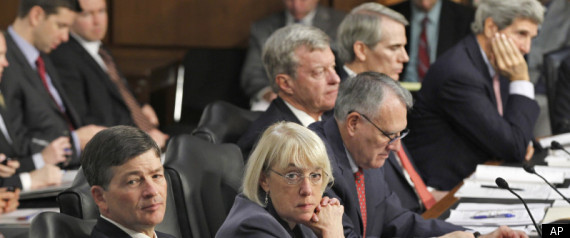 WASHINGTON -- The congressional super committee tasked with finding $1.5 trillion or so in deficit reduction is racing against the clock. Under its charter, the committee's 12 members must pass a proposal and make recommendation to Congress by November 23. Before that vote, however, they are required to take two days to look over Congressional Budget Office estimates of the proposal. The Congressional Budget Office, in turn, has indicated that it will likely need some set of proposals by early November if it is to produce the type of estimates that committee members need.
WASHINGTON -- The congressional super committee tasked with finding $1.5 trillion or so in deficit reduction is racing against the clock. Under its charter, the committee's 12 members must pass a proposal and make recommendation to Congress by November 23. Before that vote, however, they are required to take two days to look over Congressional Budget Office estimates of the proposal. The Congressional Budget Office, in turn, has indicated that it will likely need some set of proposals by early November if it is to produce the type of estimates that committee members need. But if the super committee is running out of time, its members have the luxury of granting themselves an extension.
The committee can pass a resolution that would move the November 23 deadline back a few weeks (or more, if necessary). That resolution, provided that seven of the 12 members agree to it, would be sent to Congress. Once there, it would be granted the same parliamentary benefits enjoyed by the recommendations the committee is supposed to produce -- meaning it can neither be amended nor filibustered.
There is a catch. Since even a bill extending time would be considered the "final product of the Joint Select Committee," it would have to include language that basically sets up a new committee. But that would be a minor hurdle to overcome, as the committee members could literally copy and paste their current charter into the text, changing only the deadline dates.
There is no guarantee that a majority in either chamber of Congress would approve of such an extension, should it get to the floor. In fact, as one aide argued, it "makes more sense for Congress to pass legislation extending [the committee's] time" than to have the committee pass it first (though that sequence would bring the filibuster and amendments into play).
The main holdup, however, is that few think time will help bring the bipartisan committee members any closer together. On Friday, a senior administration official theorized that members would simply pass roughly $400 billion in savings, either in mandatory spending or health care spending. Doing so would lessen the impact of the cuts triggered if the committee doesn't meet its target goal. Beyond that, there has been virtually no common ground, with revenues remaining the major sticking point.
"Because the GOP is not engaged at all on revenues ... more time won't matter," a Democratic Hill aide emailed. "In short, it's not a matter of time -- this could go on forever and they would still stand there offering a giant middle finger."
Origin
Source: Huff
No comments:
Post a Comment